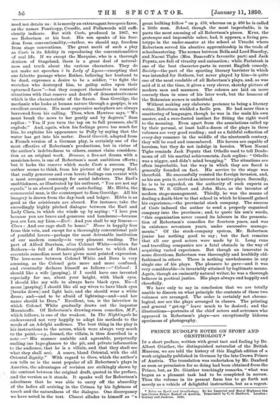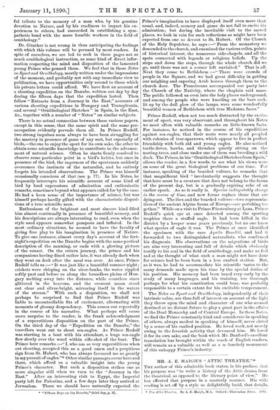PRINCE RTJDOLF'S NOTES ON SPORT AND ORNITHOLOGY.*
IN a short preface, written with great tact and feeling by Dr. Albert Giinther, the distinguished naturalist of the British Museum, we are told the history of this English edition of a work originally published in German by the late Crown Prince of Austria. The translation was undertaken by Mr. Danford as soon as permission for so doing had been obtained from the Prince, but, as Dr. Gunther touchingly remarks, " what was begun as a pleasant task had to be completed in sorrow. Thus the volume in its present form has to go forth not merely as a vehicle of delightful instruction, but as a regret- • Notes on Sport and Ornithology. By his Imperial and Royal Highness the late Crown Prince Rudolf of Austria. Translated by C. G. Danford. London : Gurney and Jackson. 1899.
ful tribute to the memory of a man who, by his genuine devotion to Nature, and by his readiness to impart his ex- periences to others, had succeeded in establishing 'a sym- pathetic bond with the more humble workers in the field of ornithology."
Dr. Gunther is not wrong in thus anticipating the feelings with which this volume will be perused by most readers. In spite of ourselves, we are led to seek in these pages not so much ornithological instruction, as some kind of direct infor- mation respecting the mind and disposition of the lamented young Prince who penned them. We feel that in these Notes on Sport and Ornithology, mostly written under the impressions of the moment, and probably not with any immediate view to publication, we have opportunities only second to those which his private letters could afford. We have first an account of a shooting expedition on the Danube, written out day by day during the fifteen days that the expedition lasted. Then follow " Extracts from a Journey in the East," accounts of various shooting expeditions in Hungary and Transylvania, and several " Ornithological Sketches " in Spain, in the East, &c., together with a number of " Notes " on similar subjects.
There is no actual connection between these various papers, except in this sense, that the same spirit and the same pre- occupation evidently pervade them all. In Prince Rudolf, two strong impulses seem always to have been struggling for the mastery in presence of game of any sort, but especially of birds,—the one to enjoy the sport for its own sake, the other to obtain some scientific knowledge to contribute to the advance- ment of natural science. Often he starts firmly resolved to observe some particular point in a bird's habits, but once in presence of the bird, the eagerness of the sportsman suddenly overcomes the instincts of the naturalist, and he entirely forgets his intended observations. The Prince was himself occasionally conscious of that (see p. 77). In his Notes, he frequently interrupts his scientific account of some kind of bird by loud expressions of admiration and enthusiastic remarks, sometimes beyond what appears called for by the case. He had a keen sense of the importance of science, but was himself perhaps hardly gifted with the characteristic disposi- tions of a true scientific man.
Enthusiasm of the brightest and most sincere kind filled him almost continually in presence of beautiful scenery, and his descriptions are always interesting to read, even when the style used appears somewhat pompons and inflated. In the most ordinary situations, he seemed to have the faculty of giving free play to his imagination in presence of Nature. To give one instance, almost every day's account of the fort- night's expedition on the Danube begins with the same poetical description of the morning, or ends with a glowing picture of the sunset. On the return journey, the prince and his companions having dined rather late, it was already dark when they went on deck after the meal was over. At once, Prince Rudolf tells us :—" It was just like a beautiful summer night; crickets were chirping on the river-banks, the water rippled softly past and before us along the boundless plains of Hun- gary melting away into the distance, while countless stars glittered in the heavens, and the crescent moon stood out clear and silver-bright, mirroring itself in the waters of the stream." With such a disposition, we shall not perhaps be surprised to find that Prince Rudolf was liable to uncontrollable fits of excitement, alternating with moments of gloomy despondency. This comes out repeatedly in the course of his narrative. What perhaps will cause more surprise to the reader, is the frank acknowledgment of a superstitious disposition on the part of the Prince. On the third day of the "Expedition on the Danube," the travellers went out to shoot sea-eagles. As Prince Rudolf was starting in a boat with his attendant, a huge sea-eagle flew slowly over the wood within rifle-shot of the boat. The Prince here remarks :—" I, who am so very superstitious when out shooting, accepted this as a good omen and a propitious sign from St. Hubert, who has always favoured me so greatly in my pursuit of eagles."* Other similar passages occur here and there, which afford us a valuable insight into the young Prince's character. But such a disposition strikes one as more singular still when we turn to the " Journey in the East." After an interesting visit to Egypt, the Imperial party left for Palestine, and a few days later they arrived at Jerusalem. There we should have naturally expected the
"Fifteen Days on the Danube," third day, p. 37.
Prince's imagination to have displayed itself even more than usual, and, indeed, scenery and game do not fail to excite his admiration; but during the inevitable visit to the sacred places, we look in vain for such reflections as might have been expected from one so devout to St. Hubert. Of the Church of the Holy Sepulchre, he says :—" From the monastery we descended to the church, and examined the various relics, points of historical interest, the numerous side-chapels, and all the spots connected with legends or religious beliefs. 17p the steps and down the steps, through the whole church did we go, until there was not a corner left unvisited." That is all. Next they come to Bethlehem :—" There were crowds of people in the Square, and we had great difficulty in getting our neighing and capering Arab horses through them to the church door. The Franciscans accompanied our party into the Church of the Nativity, where the chaplain said mass. The public followed us even into the holy places underground, and among the people who were kneeling on the bare rock, lit up by the dull glow of the lamps, were some wonderfully beautiful women of Bethlehem with true Madonna faces."
Prince Rudolf, when not too much distracted by the excite- ment of sport, was very observant, and throughout his Notes we meet often with valuable remarks on little-known facts. For instance, he noticed in the course of his expeditions against sea-eagles; that their nests were nearly all peopled with colonies of tree-sparrows, which appear to live in perfect friendship with both old and young eagles. He also noticed turtle-doves, hawks, and thrushes quietly sitting on the nesting-trees, and close under one of them was breeding a wild duck. The Prince, in his " Ornithological Sketches from Spain," allows the reader, in a few words, to see what his views were on some of the great biological problems of our time. For instance, speaking of the bearded vulture, he remarks that that magnificent bird " involuntarily suggests the thought that here must be a creature that does not belong to the fauna of the present day, but is a gradually expiring relic of an earlier epoch. As so it really is. Species indisputably change in the course of time, and new forms replace those that are dying out. The ibex and the bearded vulture—two representa- tives of the ancient Alpine fauna of Europe—are perishing to- gether." While on a visit to Prince Fiirstenberg at Lana, Prince Rudolf's quick eye at once detected among the sporting trophies there a stuffed eagle. It had been killed in the district by a keeper some years previously, but no one knew what species of eagle it was. The Prince at once identified the specimen with the rare Aquila Bonellii, and had it forwarded to two distinguished naturalists, who confirmed his diagnosis. His observations on the migrations of birds are also very interesting and full of details which obviously testify to his zeal in the field of ornithology, and make us feel sad at the thought of what such a man might not have done for science had he been born in a less exalted station. But, as it was, he had to accommodate his scientific tastes to the many demands made upon his time by the special duties of his position. His memory had been taxed very early by the study of many languages, and his training, too thorough perhaps for what his constitution could bear, was probably responsible to a certain extent for his excitable temperament.
The Notes on Sport and Ornithology, independently of their intrinsic value, are thus full of interest on account of the light they throw upon the mind and character of one who seemed destined at no distant future to play a great part in the affairs of the Dual Monarchy and of Central Europe. In these Notes, we find the Prince constantly kind and considerate in speaking of others, always modest in speaking of himself, never elated by a sense of his exalted position. He loved work, not merely owing to the feverish activity that devoured him. He loved it for its own sake, and the book which Mr. Danford's excellent translation has brought within the reach of English readers, will remain as a valuable as well as a nr ?lancholy monument of this unhappy Prince's industry.







































 Previous page
Previous page